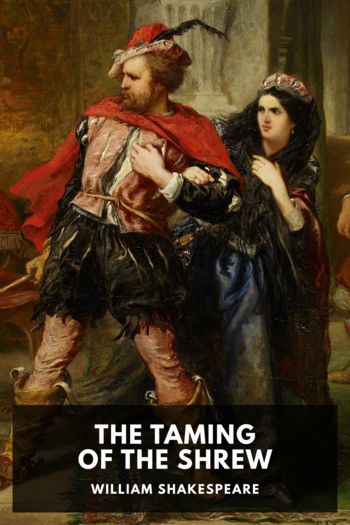The Taming of the Shrew, William Shakespeare [english readers .TXT] 📗

- Author: William Shakespeare
Book online «The Taming of the Shrew, William Shakespeare [english readers .TXT] 📗». Author William Shakespeare
You understand me, sir: so shall you stay
Till you have done your business in the city:
If this be courtesy, sir, accept of it. Pedant
O sir, I do; and will repute you ever
The patron of my life and liberty.
Then go with me to make the matter good.
This, by the way, I let you understand;
My father is here look’d for every day,
To pass assurance of a dower in marriage
’Twixt me and one Baptista’s daughter here:
In all these circumstances I’ll instruct you:
Go with me to clothe you as becomes you. Exeunt.
A room in Petruchio’s house.
Enter Katharina and Grumio. Grumio No, no, forsooth; I dare not for my life. KatharinaThe more my wrong, the more his spite appears:
What, did he marry me to famish me?
Beggars, that come unto my father’s door,
Upon entreaty have a present aims;
If not, elsewhere they meet with charity:
But I, who never knew how to entreat,
Nor never needed that I should entreat,
Am starved for meat, giddy for lack of sleep,
With oaths kept waking and with brawling fed:
And that which spites me more than all these wants,
He does it under name of perfect love;
As who should say, if I should sleep or eat,
’Twere deadly sickness or else present death.
I prithee go and get me some repast;
I care not what, so it be wholesome food.
I fear it is too choleric a meat.
How say you to a fat tripe finely broil’d?
I cannot tell; I fear ’tis choleric.
What say you to a piece of beef and mustard?
Nay then, I will not: you shall have the mustard,
Or else you get no beef of Grumio.
Go, get thee gone, thou false deluding slave, Beats him.
That feed’st me with the very name of meat:
Sorrow on thee and all the pack of you,
That triumph thus upon my misery!
Go, get thee gone, I say.
Pluck up thy spirits; look cheerfully upon me.
Here, love; thou see’st how diligent I am
To dress thy meat myself and bring it thee:
I am sure, sweet Kate, this kindness merits thanks.
What, not a word? Nay, then thou lovest it not;
And all my pains is sorted to no proof.
Here, take away this dish.
The poorest service is repaid with thanks;
And so shall mine, before you touch the meat.
Signior Petruchio, fie! you are to blame.
Come, mistress Kate, I’ll bear you company.
Aside. Eat it up all, Hortensio, if thou lovest me.
Much good do it unto thy gentle heart!
Kate, eat apace: and now, my honey love,
Will we return unto thy father’s house
And revel it as bravely as the best,
With silken coats and caps and golden rings,
With ruffs and cuffs and fardingales and things;
With scarfs and fans and double change of bravery,
With amber bracelets, beads and all this knavery.
What, hast thou dined? The tailor stays thy leisure,
To deck thy body with his ruffling treasure.
Come, tailor, let us see these ornaments;
Lay forth the gown.
Why, this was moulded on a porringer;
A velvet dish: fie, fie! ’tis lewd and filthy:
Why, ’tis a cockle or a walnut-shell,
A knack, a toy, a trick, a baby’s cap:
Away with it! come, let me have a bigger.
I’ll have no bigger: this doth fit the time,
And gentlewomen wear such caps as these
When you are gentle, you shall have one too,
And not till then.
Why, sir, I trust I may have leave to speak;
And speak I will; I am no child, no babe:
Your betters have endured me say my mind,
And if you cannot, best you stop your ears.
My tongue will tell the anger of my heart,
Or else my heart concealing it will break,
And rather than it shall, I will be free
Even to the uttermost, as I please, in words.
Why, thou say’st true; it is a paltry cap,
A custard-coffin, a bauble, a silken pie:
I love thee well, in that thou likest it not.
Love me or love me not, I like the cap;
And it I will have, or I will have none. Exit Haberdasher.
Thy gown? why, ay: come, tailor, let us see’t.
O mercy, God! what masquing stuff is here?
What’s this? a sleeve? ’tis like a demi-cannon:
What, up and down, carved like an apple-tart?
Here’s snip and nip and cut and slish and slash,
Like to a censer in a barber’s shop:
Why, what, i’ devil’s name, tailor, call’st thou this?
You bid me make it orderly and well,
According to the fashion and the time.
Marry, and did; but if you be remember’d,
I did not bid you mar it to the time.
Go, hop me over every kennel home,
For you shall hop without my custom, sir:
I’ll none of it: hence! make your best of it.
I never saw a better-fashion’d gown,
More quaint, more pleasing, nor more commendable:
Belike you mean to make a puppet of me.
O monstrous arrogance! Thou liest, thou thread, thou thimble,
Thou yard, three-quarters, half-yard, quarter, nail!
Thou flea, thou nit, thou winter-cricket thou!
Braved in mine own house with a skein





Comments (0)